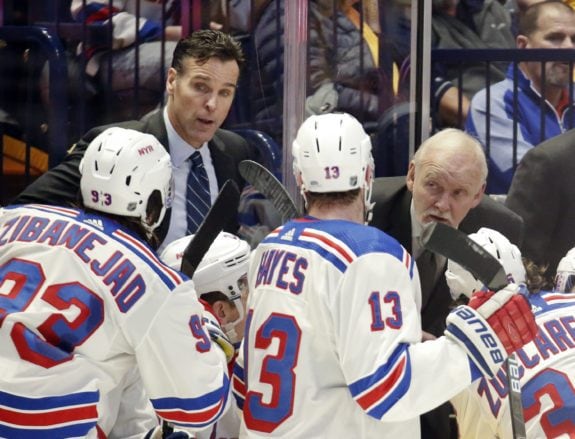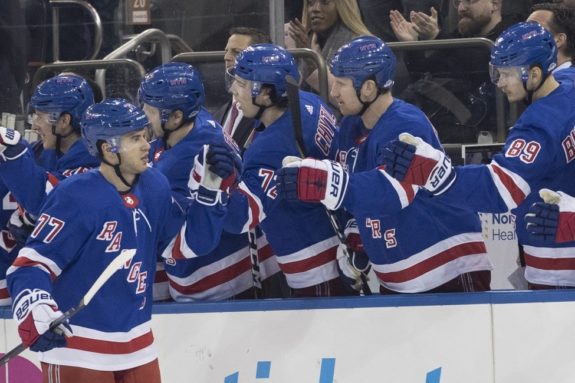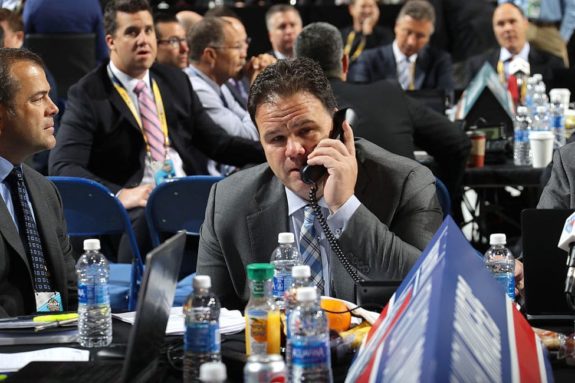A team’s effort to play 60 minutes each night is a reflection of their coach, and the New York Rangers outperformed everyone’s expectations for the 2018-19 season in every way. David Quinn’s coaching philosophy is based on accountability and he has changed the culture in his first season as the Rangers coach.
What has caused the turnaround? First and foremost, Quinn is a teacher who doesn’t like shuffling his roster for the sake of change. His collegiate background taught him that if you give a young athlete a scholarship, then it’s your job to make that player better.

Quinn took this philosophy to the professional level by implementing a structured system that held players accountable for their actions on the ice. At times, the process was frustrating, especially for players who were benched for inconsistent play. Instead of sulking about their predicament, Quinn expected them to reclaim their spot in the lineup by working that much harder in practice.
Rangers Far Exceeded Preseason Expectations
The Rangers were expected to struggle to compete in 2018-19. Instead, they looked well-prepared by playing a discipline style that pressured their opponents into turning the puck over in the neutral zone. It wasn’t a perfect roster, but Quinn challenged his players to be their best each night.

He did a terrific job of determining which lines were playing well together and identifying those who weren’t producing. Quinn’s in-game decisions to shorten his lines were about changing the flow of the contest and gaining an advantage that gave the Rangers the best chance to win.
Quinn Was the Right Choice for Rebuild
The Rangers knew exactly what they were getting when they hired Quinn. His resume was impressive as they plucked him from the collegiate ranks where he was highly successful in five seasons at Boston University with a 105-67-21 record. The front office wanted a new voice behind the bench that was a teacher, a communicator and tactician who could instill a winning culture inside the locker room.

Quinn was faced with a major challenge as he inherited a gutted roster that was in the midst of a rebuild. Together with general manager Jeff Gorton, Quinn expected each player to get emotionally invested in getting better each day at the rink. It didn’t take long for the players to believe in Quinn’s message and grow into one cohesive unit.
Zibanejad Among Others to Excel Under Quinn’s Reign
The Derek Brassard for Mika Zibanejad trade wasn’t well received by Rangers fans at first, but those doubts were laid to rest after another outstanding season. Zibanejad led the team in scoring with 30 goals and 74 points. He was great in all aspects, especially on special teams where he scored 11 power play goals and added two short-handed goals. It’s clear that his game is made to shine in New York.
The transformation of the Rangers under Quinn began when he chose to keep Brett Howden on the roster instead of sending him back to the minors for more seasoning. During training camp, no one expected Howden to survive the final roster cuts, but his play in the preseason showed he was ready to contribute. At times, Howden struggled badly, but Quinn showed the patience needed to transform potential into a top nine forward.
One player who started the season in Quinn’s doghouse, but found a role that allowed him to (21 goals) flourish and end the season on a positive note was Pavel Buchnevich. Another pleasant surprise was Alexandar Georgiev who played himself into the conversation of being a viable candidate as the heir apparent to King Henrik’s throne. Georgiev had 14 wins, a .914 save percentage and 3.11 goals-against average in 30 starts.
Yes, the Rangers missed the playoffs for the second consecutive season. It may take another season before they transform into a serious playoff contender. Changing the culture of an organization can be a tricky proposition, but no one can argue that Quinn isn’t on the right road to bringing the Rangers back to prominence.
The players have bought into his system to be their best each night. Clearly, it’s still a work in progress, but the building blocks are in place.